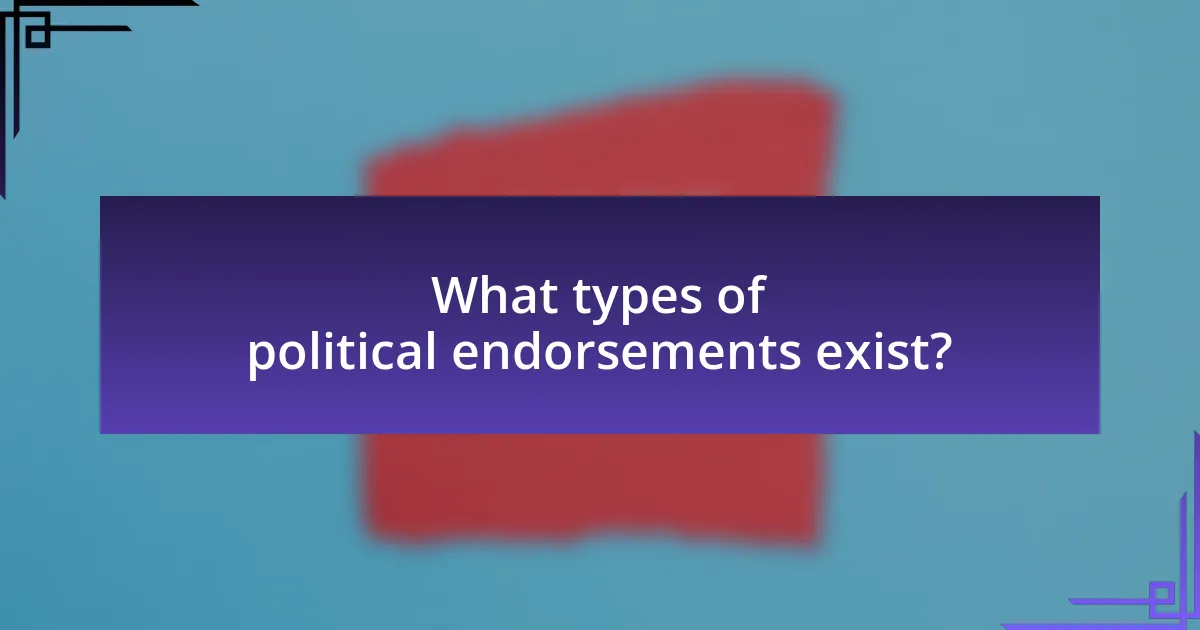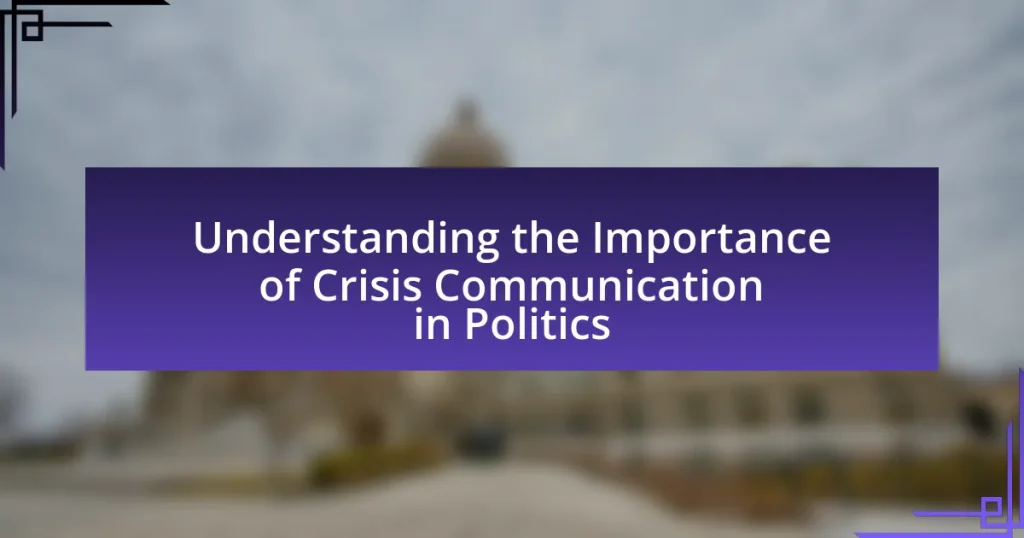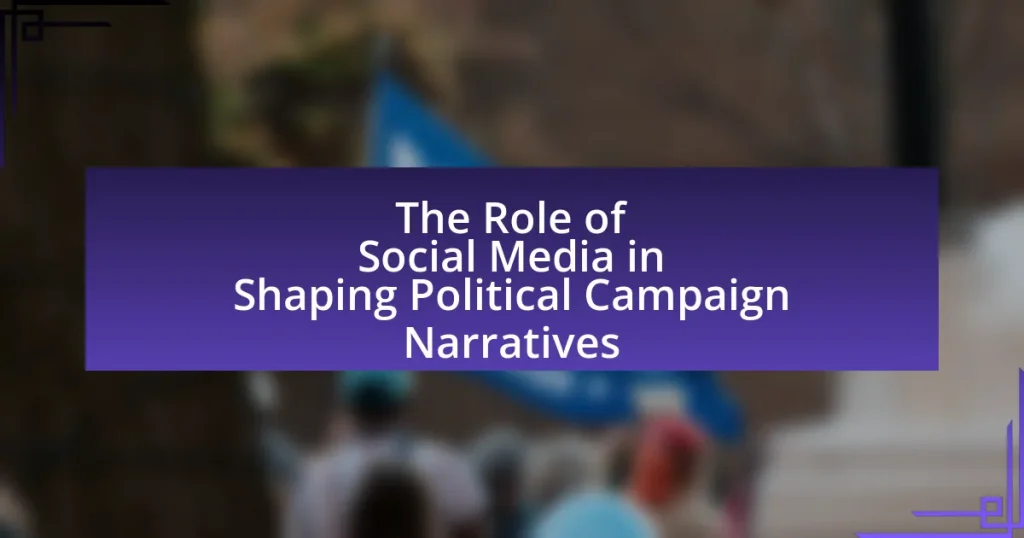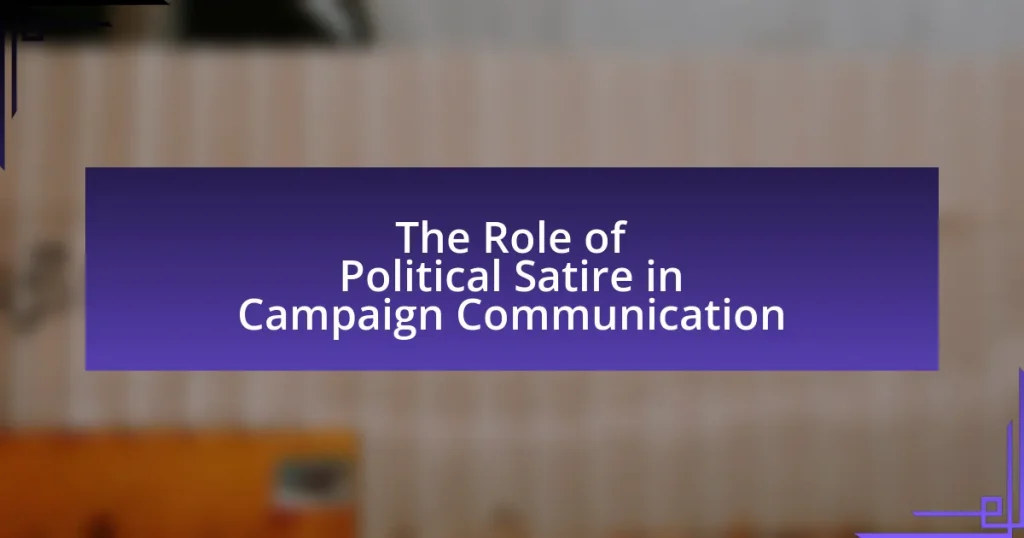The article examines the effect of political endorsements on candidate credibility, highlighting how endorsements from respected figures or organizations enhance perceived trustworthiness and influence voter perceptions. It discusses the mechanisms through which endorsements operate, including their impact on public opinion, the importance of timing, and the credibility of endorsers. Additionally, the article categorizes different types of endorsements, analyzes their varying impacts in local versus national elections, and explores demographic and cultural factors that shape endorsement effectiveness. Strategies for candidates to leverage endorsements effectively are also outlined, emphasizing the significance of aligning with credible endorsers to maximize voter support.

What is the Effect of Political Endorsements on Candidate Credibility?
Political endorsements significantly enhance candidate credibility by leveraging the trust and influence of the endorsing figures. When a respected political figure or organization endorses a candidate, it signals to voters that the candidate possesses qualities deemed valuable, such as competence and integrity. Research indicates that endorsements can lead to increased voter support; for instance, a study by the Pew Research Center found that candidates with endorsements from well-known figures saw a 20% increase in perceived trustworthiness among voters. This effect is particularly pronounced in competitive races, where endorsements can sway undecided voters and solidify support among party loyalists.
How do political endorsements influence public perception of candidates?
Political endorsements significantly shape public perception of candidates by enhancing their credibility and trustworthiness. When a respected figure or organization endorses a candidate, it often leads voters to view that candidate more favorably, as endorsements serve as a form of social proof. Research indicates that endorsements can increase a candidate’s support by as much as 10% to 20%, particularly among undecided voters. For instance, a study by the Pew Research Center found that endorsements from influential political figures can sway public opinion, especially in closely contested races. This influence is rooted in the psychological principle of authority, where individuals are more likely to trust and follow the opinions of those they perceive as knowledgeable or credible.
What factors contribute to the credibility of a political endorsement?
The credibility of a political endorsement is primarily influenced by the endorser’s reputation, expertise, and alignment with the values of the candidate. A well-respected figure or organization endorsing a candidate can significantly enhance the perceived trustworthiness of that endorsement. For instance, endorsements from established political leaders or reputable organizations often carry more weight due to their established credibility and influence within the political landscape. Additionally, the endorser’s previous track record and their relevance to the candidate’s platform can further validate the endorsement. Research indicates that endorsements from individuals or groups that share similar ideologies with the candidate tend to resonate more with voters, thereby increasing the endorsement’s effectiveness.
How does the timing of endorsements affect candidate credibility?
The timing of endorsements significantly impacts candidate credibility by influencing public perception and voter trust. Early endorsements can lend immediate legitimacy to a candidate, signaling strong support from influential figures, which can enhance their perceived viability. Conversely, late endorsements may be viewed as opportunistic, potentially undermining a candidate’s credibility if voters perceive them as lacking genuine support. Research indicates that endorsements closer to election dates can have diminishing returns on credibility, as voters may question the sincerity of the endorsement. For instance, a study by the American Political Science Review found that endorsements made well in advance of elections tend to have a more substantial positive effect on candidate credibility compared to those made shortly before voting.
Why are political endorsements important in elections?
Political endorsements are important in elections because they significantly enhance a candidate’s credibility and influence voter perceptions. Endorsements from respected figures or organizations can validate a candidate’s qualifications and align them with the values of the endorsing entity, thereby attracting undecided voters. For instance, a study by the Pew Research Center found that 70% of voters consider endorsements from trusted individuals or groups as a key factor in their decision-making process. This demonstrates that endorsements not only provide social proof but also can sway public opinion, making them a critical component of electoral success.
What role do endorsements play in voter decision-making?
Endorsements significantly influence voter decision-making by enhancing a candidate’s credibility and perceived trustworthiness. Research indicates that voters often rely on endorsements from trusted figures or organizations to guide their choices, particularly when they lack detailed knowledge about candidates. For instance, a study by the Pew Research Center found that 60% of voters consider endorsements important in their decision-making process, as they signal approval from respected sources. This reliance on endorsements can sway undecided voters and reinforce the preferences of those already leaning towards a candidate, ultimately impacting election outcomes.
How do endorsements impact the overall election outcome?
Endorsements significantly influence overall election outcomes by enhancing candidate credibility and voter trust. Research indicates that candidates who receive endorsements from influential figures or organizations often experience increased support, as these endorsements serve as a signal of reliability and competence. For instance, a study by the Pew Research Center found that 70% of voters consider endorsements important when making their electoral decisions. This demonstrates that endorsements can sway undecided voters and solidify the base of supporters, ultimately impacting the election results.

What types of political endorsements exist?
Political endorsements can be categorized into several types, including individual endorsements, organizational endorsements, and party endorsements. Individual endorsements come from prominent figures, such as politicians, celebrities, or community leaders, who lend their personal support to a candidate. Organizational endorsements are provided by groups, such as labor unions, advocacy organizations, or professional associations, which represent collective interests. Party endorsements occur when a political party officially supports a candidate, often influencing voter perception and credibility. These types of endorsements play a significant role in shaping public opinion and can enhance a candidate’s credibility by associating them with trusted figures or organizations.
How do different types of endorsements vary in their impact?
Different types of endorsements vary in their impact based on the source, context, and audience perception. For instance, endorsements from well-respected political figures or organizations tend to carry more weight and can significantly enhance a candidate’s credibility, as evidenced by a study from the American Political Science Review, which found that endorsements from party leaders can increase voter support by up to 20%. In contrast, endorsements from less recognized individuals or groups may have minimal effect, as they lack the authority or influence to sway public opinion. Additionally, the timing of endorsements can also influence their impact; early endorsements may help establish momentum, while late endorsements might be perceived as opportunistic. Thus, the effectiveness of endorsements is contingent upon their source, timing, and the perceived credibility of the endorser.
What are the differences between individual and organizational endorsements?
Individual endorsements come from single persons expressing support for a candidate, while organizational endorsements are made by groups or institutions endorsing a candidate collectively. Individual endorsements often reflect personal beliefs and can resonate with voters on a personal level, as they may carry emotional weight and authenticity. In contrast, organizational endorsements typically represent a collective stance, which can lend credibility and signify broader support within a community or sector. For example, a prominent individual like a celebrity may influence public opinion through personal charisma, while an organization like a labor union can mobilize its members and resources to advocate for a candidate, thereby amplifying the endorsement’s impact.
How do celebrity endorsements compare to traditional political endorsements?
Celebrity endorsements differ from traditional political endorsements primarily in their appeal and influence mechanisms. While traditional political endorsements often come from established political figures or organizations, leveraging their credibility and political experience, celebrity endorsements capitalize on the personal brand and emotional connection that celebrities have with their audience. Research indicates that celebrity endorsements can significantly enhance a candidate’s visibility and relatability, particularly among younger voters, as seen in the 2008 and 2016 U.S. presidential elections where celebrities played a crucial role in mobilizing youth turnout. In contrast, traditional endorsements tend to emphasize political alignment and experience, which may resonate more with older or more politically engaged demographics. Thus, while both types of endorsements aim to enhance candidate credibility, they operate through different channels of influence and target different voter segments.
What are the potential risks associated with political endorsements?
Political endorsements carry several potential risks, including alienation of certain voter demographics and damage to the endorser’s reputation. When a prominent figure endorses a candidate, they may inadvertently polarize their own supporters, leading to backlash from those who oppose the endorsed candidate. For instance, a study by the Pew Research Center found that political endorsements can deepen partisan divides, as individuals often align their views with those of their preferred endorsers. Additionally, if the endorsed candidate faces scandals or fails to meet public expectations, the endorser may suffer reputational harm, as seen in cases where celebrities or organizations faced criticism for supporting candidates who later engaged in controversial behavior.
How can a negative endorsement affect a candidate’s credibility?
A negative endorsement can significantly undermine a candidate’s credibility by associating them with unfavorable opinions or actions. When a prominent figure or organization publicly criticizes a candidate, it can lead voters to question the candidate’s qualifications, integrity, and overall suitability for office. Research indicates that negative endorsements can sway public perception; for example, a study published in the Journal of Politics found that candidates receiving negative endorsements experienced a measurable decline in voter support, as voters often align their views with those of influential endorsers. This correlation highlights how negative endorsements can create doubt and diminish trust in a candidate, ultimately affecting their electoral prospects.
What happens when an endorser’s reputation is damaged?
When an endorser’s reputation is damaged, it negatively impacts the credibility of the candidate they support. This occurs because voters often associate the endorser’s character and integrity with the candidate, leading to diminished trust and support for the candidate. Research indicates that endorsements from reputable figures can enhance a candidate’s image, while endorsements from individuals with tarnished reputations can lead to a backlash, resulting in decreased voter confidence and potential loss of votes. For example, a study published in the Journal of Politics found that negative news about an endorser can lead to a significant drop in approval ratings for the endorsed candidate, illustrating the direct correlation between an endorser’s reputation and candidate credibility.

How do political endorsements affect candidate credibility in different contexts?
Political endorsements significantly enhance candidate credibility by signaling trust and support from influential figures or organizations. In contexts such as local elections, endorsements from community leaders can increase a candidate’s perceived relatability and commitment to local issues, thereby boosting voter confidence. Conversely, in national elections, endorsements from prominent political figures or parties can lend legitimacy and broaden a candidate’s appeal across diverse voter demographics. For instance, a study by the Pew Research Center found that 70% of voters consider endorsements from trusted figures as a key factor in their decision-making process. This demonstrates that endorsements can effectively shape public perception and influence electoral outcomes by reinforcing a candidate’s qualifications and alignment with voter values.
What is the impact of endorsements in local versus national elections?
Endorsements significantly impact local elections by enhancing candidate visibility and credibility within their communities, while in national elections, endorsements often serve to consolidate support among broader demographics and influential groups. In local elections, endorsements from community leaders or organizations can sway voter opinions due to the personal connections and trust established within smaller populations. For instance, a study by the Pew Research Center found that local endorsements can increase voter turnout by up to 20% in municipal races. Conversely, in national elections, endorsements from prominent figures or organizations, such as political parties or influential media outlets, can amplify a candidate’s message and legitimacy, as seen in the 2008 presidential election where Barack Obama received endorsements from major figures like Oprah Winfrey, which significantly boosted his national profile. Thus, while both local and national endorsements enhance credibility, their mechanisms and effects differ based on the scale and context of the elections.
How do endorsements influence candidates in primary elections?
Endorsements significantly influence candidates in primary elections by enhancing their credibility and visibility among voters. When a respected figure or organization endorses a candidate, it signals to voters that the candidate is a viable choice, often leading to increased support and donations. For instance, a study by the Pew Research Center found that candidates who receive endorsements from influential political figures tend to experience a boost in polling numbers, as voters often rely on these endorsements to make informed decisions. This effect is particularly pronounced in competitive primaries, where endorsements can sway undecided voters and consolidate support within party factions.
What role do endorsements play in general elections?
Endorsements play a crucial role in general elections by enhancing a candidate’s credibility and influencing voter perceptions. When a respected individual or organization endorses a candidate, it signals to voters that the candidate is trustworthy and has the support of influential figures, which can sway undecided voters. For instance, a study by the Pew Research Center found that endorsements from local leaders can significantly increase a candidate’s favorability ratings among constituents. This demonstrates that endorsements not only validate a candidate’s qualifications but also mobilize voter support, ultimately impacting election outcomes.
How do demographic factors influence the effectiveness of endorsements?
Demographic factors significantly influence the effectiveness of endorsements by shaping the perceptions and receptivity of target audiences. For instance, age, gender, ethnicity, and socioeconomic status can determine how endorsements are received, as different demographic groups may have varying values, beliefs, and trust levels in endorsers. Research indicates that endorsements from individuals who share similar demographic characteristics with the audience tend to be more persuasive; for example, a study published in the Journal of Political Marketing found that endorsements from minority leaders were more impactful among minority voters, enhancing candidate credibility and relatability. This alignment between the endorser and the audience fosters trust and increases the likelihood of endorsement effectiveness.
What is the relationship between voter demographics and endorsement impact?
Voter demographics significantly influence the impact of endorsements on candidate credibility. Different demographic groups, such as age, race, and socioeconomic status, respond variably to endorsements based on their values and priorities. For instance, research indicates that endorsements from trusted community leaders can sway younger voters more effectively, while older voters may prioritize endorsements from established political figures. A study by the Pew Research Center found that 65% of voters aged 18-29 consider endorsements important, compared to 45% of voters aged 65 and older. This demonstrates that the effectiveness of endorsements is closely tied to the demographic characteristics of the voter base, affecting how candidates are perceived and their overall electoral success.
How do cultural factors shape the perception of endorsements?
Cultural factors significantly shape the perception of endorsements by influencing how individuals interpret the credibility and relevance of the endorsing figures. For instance, in collectivist cultures, endorsements from community leaders or respected figures are often viewed as more trustworthy due to the emphasis on group harmony and social validation. Conversely, in individualistic cultures, personal achievements and individual endorsements may carry more weight, leading to a different interpretation of credibility. Research indicates that cultural context can alter the effectiveness of endorsements; for example, a study published in the Journal of Cross-Cultural Psychology by Matsumoto and Juang (2016) highlights that cultural values directly impact consumer behavior and trust in endorsements. Thus, understanding cultural nuances is essential for evaluating the impact of endorsements on candidate credibility.
What strategies can candidates use to leverage endorsements effectively?
Candidates can leverage endorsements effectively by strategically showcasing them in their campaign materials and communications. By prominently displaying endorsements from influential figures or organizations, candidates can enhance their credibility and appeal to voters who value the opinions of those endorsers. Research indicates that endorsements can significantly influence voter perceptions; for instance, a study by the Pew Research Center found that 70% of voters consider endorsements when making their decisions. Additionally, candidates should engage with endorsers to amplify their messages through joint appearances or social media campaigns, thereby reaching a broader audience and reinforcing their alignment with respected figures.
How can candidates choose the right endorsers for their campaigns?
Candidates can choose the right endorsers for their campaigns by selecting individuals who align with their values, resonate with their target audience, and possess credibility within the political landscape. Endorsers should have a strong following and influence in the community, as research indicates that endorsements from respected figures can significantly enhance a candidate’s perceived credibility. For instance, a study published in the Journal of Politics found that candidates endorsed by well-known political figures experienced a measurable increase in voter support, demonstrating the impact of strategic endorsement choices.
What are best practices for utilizing endorsements in campaign messaging?
Best practices for utilizing endorsements in campaign messaging include strategically selecting endorsers who align with the candidate’s values and target audience. This alignment enhances credibility and relatability, as seen in the 2020 U.S. presidential election where endorsements from influential figures significantly swayed voter perceptions. Additionally, incorporating endorsements into various campaign materials—such as advertisements, social media, and speeches—amplifies their impact, as evidenced by studies showing that candidates with high-profile endorsements experience increased voter support. Finally, ensuring that endorsements are communicated authentically and consistently throughout the campaign reinforces trust and strengthens the candidate’s overall message.



